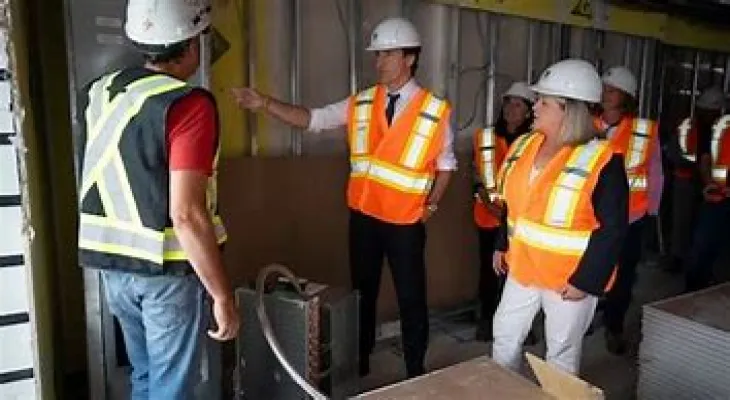Search here
Newspaper
Search here

Arab Canada News
News

Published: November 17, 2023
The federal grant program that provides money to homeowners to make their homes more energy-efficient is running out of funds faster than expected – raising concerns among homeowners and industry stakeholders who fear the program may end earlier than anticipated.
Natural Resources Minister Jonathan Wilkinson confirmed that the program is spending its allocated budget quickly due to high demand for home upgrade grants. He stopped short of saying that Natural Resources Canada (NRCAN) might abruptly close applications and suggested extending the program.
Wilkinson said, "Yes, we have already started to run out of funds earlier than we expected, and this is largely due to the popularity of the program."
,The Greener Homes Grant program, launched by the federal government in 2021, provides homeowners up to $5,000 to make energy efficiency upgrades and home energy assessments and up to $600 to help with the cost of home energy assessments.
,Homeowners must spend the money upfront and then get reimbursed, and the $2.6 billion program was supposed to run until 2027, or until the funds run out; some suggest the money will run out in 2024.
Diana Persan thought she had until 2027 to apply, and she said she was delaying committing to renovations and subscribing to the program while paying her mortgage installments on her new home in Ottawa.
Persan said when CBC told her the program is consuming funds faster than planned: "It’s a shock for me."
Persan said she hopes the program will help her replace a gas furnace with a heat pump and change her leaking windows. Persan said if the program is canceled, she and her partner might have to invest in a fossil fuel heating system.
Persan added, "It would be very unfortunate because I like to be more environmentally friendly," "but it’s about what I can afford, and what is possible with the money we have."
She called on Ottawa to extend the program, given the large number of Canadians struggling with the cost of living.
Natural Resources Canada says more than 124,000 applicants have received funding through the national portal or joint-delivery partners in Quebec, Ontario, and Nova Scotia, and the department has paid over $450 million of the $2.6 billion allocated in the program’s budget.
Wilkinson said heat pumps are the most common upgrade funded by the program so far.
Wilkinson said, "We have a certain budget envelope. We have to exhaust that envelope or use it before we can claim additional money from the Finance Minister."
"Budgets are usually set in March or April, but at this point, we have money for a number of months so we can actually continue accepting applications."
Brent Kuperson, executive director of the Windfall Environmental Centre in Durham, said one of his staff attended a November meeting with NRCAN officials and was warned that the program might stop soon.
Kuperson added that the current program predicament feels like déjà vu. He pointed out that the previous federal government halted a similar ecoEnergy home upgrade program in 2012.
Kuperson said the upgrade program led to the emergence of new companies specializing in home decarbonization, and warned that history might repeat itself.
He said, "We are in a climate emergency and we cannot put our foot on the brakes. We really need to accelerate the program," "So ending this program prematurely without an immediate replacement would cause huge chaos in this sector."
After launching the upgrade program, the Trudeau government announced it would provide up to $10 million in contracts to hire, train, and mentor 2,000 energy auditors to advise homeowners on energy efficiency.
Dylan Tripples was one of the trainees involved in the NRCAN program. The 30-year-old left his tech job at a company hoping to become part of an army of registered energy auditors; Tripples calls himself a "climate weary" person who agreed to a pay cut and joined a movement to decarbonize and electrify homes.
Greenhouse gas emissions from buildings made up 13 percent of Canada’s total emissions in 2021 – about 87 megatons – making them the third-highest source of emissions after oil and gas production and transportation. Canada has pledged in its emission reduction plan to cut emissions from buildings by 37 percent by 2030 and achieve net zero by 2050.
Tripples said if the Greener Homes program ended suddenly, he might not be able to continue his work.
He said, "I’ve been doing this for about a year. To pull the rug out a bit... we knew this program would end sometime, but it seems to be sooner than expected."
Others connected to the energy efficiency industry are urging Ottawa not to interrupt growth in the emerging clean tech sector that includes registered energy auditors and heat pump installers.
Abhilash Kantamneni, research director at Carleton University, said, "All these people who entered this sector hoping for a better career and livelihood, I worry that this kind of start-stop funding cycle can jeopardize their livelihoods." Efficiency Canada advocacy and research center.
He called on the government to make early commitments to expand the program, providing other forms of support that can help all Canadians improve energy efficiency in their homes.
Kantamneni said, "What the government should do is indicate a long-term political commitment and political certainty ... as a way to ... meet our climate goals and [do] so in a way that leaves no one behind."
Comments